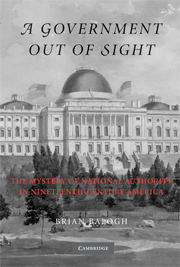Book contents
- Frontmatter
- Contents
- Acknowledgments
- 1 Introduction: Why Look Back?
- 2 How Americans Lost Sight of the State: Adapting Republican Virtue to Liberal Self-Interest
- 3 Between Revolutions: The Promise of the Developmental Vision
- 4 “To Strengthen and Perpetuate that Union”: Republican Political Economy
- 5 Outside the Boundaries: “Powers and Energies in the Extreme Parts”
- 6 The Uncontested State: Letters, Law, Localities
- 7 Restoring “Spontaneous Action and Self-Regulation”: Civil War and Civil Society
- 8 Judicial Exceptions to Gilded Age Laissez-Faire
- 9 “A Special Form of Associative Action”: New Liberalism and the National Integration of Public and Private
- 10 Conclusion: Sighting the Twentieth-Century State
- Index
6 - The Uncontested State: Letters, Law, Localities
Published online by Cambridge University Press: 05 August 2012
- Frontmatter
- Contents
- Acknowledgments
- 1 Introduction: Why Look Back?
- 2 How Americans Lost Sight of the State: Adapting Republican Virtue to Liberal Self-Interest
- 3 Between Revolutions: The Promise of the Developmental Vision
- 4 “To Strengthen and Perpetuate that Union”: Republican Political Economy
- 5 Outside the Boundaries: “Powers and Energies in the Extreme Parts”
- 6 The Uncontested State: Letters, Law, Localities
- 7 Restoring “Spontaneous Action and Self-Regulation”: Civil War and Civil Society
- 8 Judicial Exceptions to Gilded Age Laissez-Faire
- 9 “A Special Form of Associative Action”: New Liberalism and the National Integration of Public and Private
- 10 Conclusion: Sighting the Twentieth-Century State
- Index
Summary
Standard accounts of American political development in the first half of the nineteenth century are constructed around the triumph of the private over the public. The expanding franchise, which ushered in Jacksonian democracy, coupled with market expansion, empowered mobile individuals who embraced laissez-faire. Yet, we have already seen that the federal government carried out crucial activities beyond its boundaries. It conducted relations with foreign nations, sovereign tribes, and settlers, who, aided by federal land policy and military support, were constantly redrawing the nation's boundaries. Without these public actions, the shape of both polity and market would have been quite different.
This chapter examines three vibrant extensions of the state in the first half of the nineteenth century that were not confined to the margins of the nation, or engaged in foreign policy. At the federal level, the Post Office Department dwarfed foreign counterparts in its reach and its ambition. It also overshadowed domestic counterparts in the private sector. Viewed as a nationally subsidized information infrastructure, the Post Office was instrumental in promoting political debate. The second critical element was the law. Lodged at the federal, state, and local levels, the law was a crucial ingredient in a society that eschewed visible trappings of public authority. It constructed a framework that made private economic and social decisions both feasible and predictable. Finally, Americans trusted expansion at the local level more than through the General Government. Americans were far more willing to use local public authority and financing than to go through their national counterparts. Citizens turned to state and local means to realize developmental ends when markets failed.
- Type
- Chapter
- Information
- A Government Out of SightThe Mystery of National Authority in Nineteenth-Century America, pp. 219 - 276Publisher: Cambridge University PressPrint publication year: 2009



